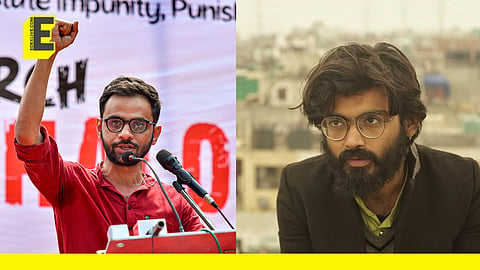

The Delhi Police has opposed the bail pleas of Umar Khalid, Sharjeel Imam, and other accused in the 2020 Delhi riots case, asserting that the prosecution has not attempted to delay the trial proceedings.
During the hearing in the Delhi High Court (HC) today, Wednesday, February 12, police officials argued that the accused themselves were responsible for the delays and that the right to a speedy trial does not automatically entitle them to bail, as reported by PTI.
A bench comprising Justices Navin Chawla and Shalinder Kaur heard arguments from Additional Solicitor General Chetan Sharma and Special Public Prosecutor Amit Prasad.
Sharma stated that there was no evidence suggesting prosecution-induced delays and insisted that the responsibility lay with the accused.
"The trial court records do not indicate any delay on the part of the prosecution. Instead, the delay is caused by the accused themselves," Sharma argued.
Prasad supported this claim by referring to judicial orders that, he said, demonstrated how the case had been delayed at the request of the accused. He further pointed out that, despite day-to-day hearings, a few of the accused had sought a two-week delay in proceedings.
“National security concerns”
Sharma emphasised that cases involving terrorism and national security required a different standard of adjudication. While acknowledging the necessity of a speedy trial, he argued that prolonged incarceration alone was not a sufficient reason to grant bail in cases involving anti-national activities.
"The right to a speedy trial is not an unrestricted pass. The interests of society must take precedence over individual rights," Sharma stated.
He further urged the court to consider the intent of the accused and the loss of lives in the case, added PTI.
Allegations
The accused, including Khalid and Imam, were charged under the Unlawful Activities (Prevention) Act (UAPA) and sections of the Indian Penal Code (IPC) for allegedly orchestrating the violence during protests against the Citizenship Amendment Act (CAA) and National Register of Citizens (NRC). The violence resulted in 53 deaths and over 700 injuries.
Sharma reminded the court that two previous high court benches had ruled that a conspiracy existed and that UAPA charges were applicable. He further noted that the accused were facing charges that could lead to a maximum punishment of life imprisonment.
Bail pleas and legal history
Khalid, Imam, and others have cited their prolonged incarceration and sought bail on grounds of parity with co-accused who have been granted bail. Several bail petitions, including those filed by Imam, Gulfisha Fatima, and Khalid Saifi, date back to 2022 and have been heard by multiple benches.
Khalid had previously approached the Delhi High Court for bail in 2022, but his plea was rejected in October 2022. In 2024, he moved the high court again, seeking bail for the second time.
The matter is scheduled to continue on February 20.
